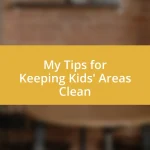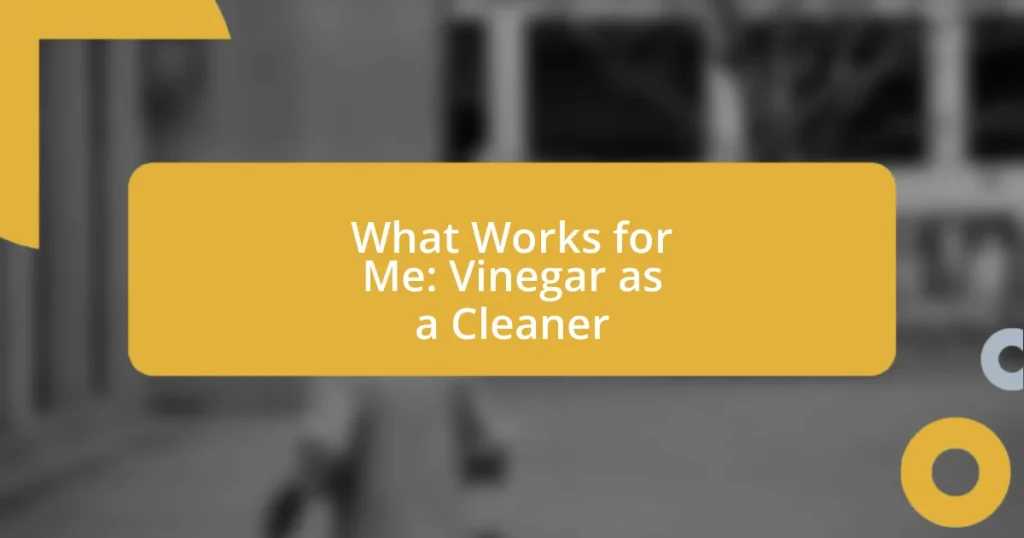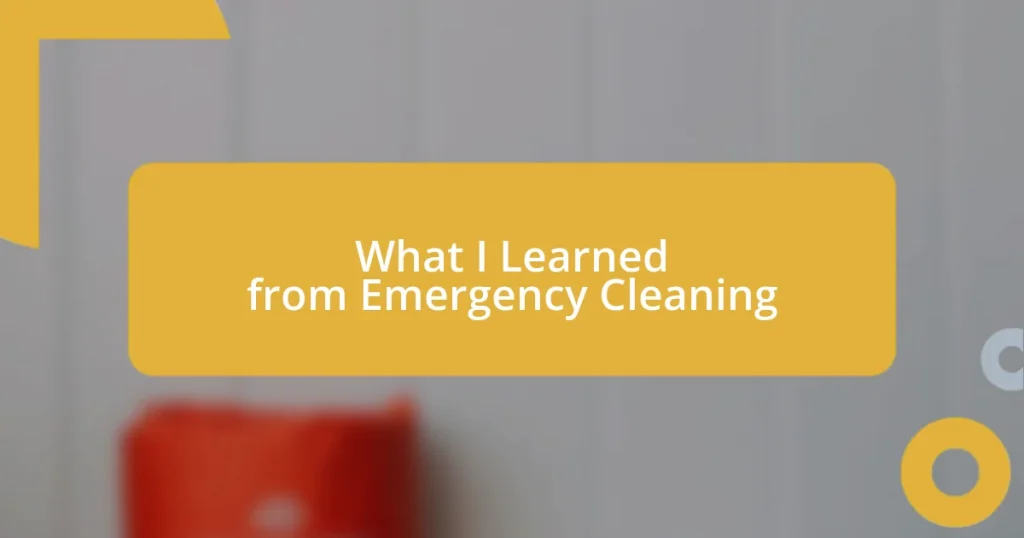Key takeaways:
- Vinegar is an effective, eco-friendly cleaning agent that acts as a disinfectant, deodorizer, and stain remover, offering a natural alternative to harsh chemicals.
- Different types of vinegar (white, apple cider, and malt) have unique cleaning properties suited for specific tasks, such as disinfecting and removing hard water stains.
- Safety precautions are critical when using vinegar; avoid mixing with bleach, test surfaces before cleaning, and ensure proper ventilation to mitigate strong odors.

Introduction to Vinegar as Cleaner
Vinegar has long been a staple in many households, but its potential as a cleaner is often overlooked. From my early days of experimenting in my first apartment, I discovered that this humble pantry item can tackle grime and odors like no other. Isn’t it refreshing to think that something so simple can be an effective cleaning agent?
When I first stumbled upon vinegar’s versatility, I was amazed by its ability to cut through grease and disinfect surfaces. I remember feeling a sense of triumph after using it to remove stains from my kitchen counters—what a game changer! Have you ever thought about how easily we can swap out harsh chemicals for an effective, all-natural alternative?
Moreover, the moment I learned that vinegar can neutralize odors, my outlook on cleaning transformed. I found myself reaching for that bottle instead of commercial sprays, not only for the environment’s sake but also for the safety of my pets. Doesn’t that make you wonder what other secrets this unassuming liquid holds?
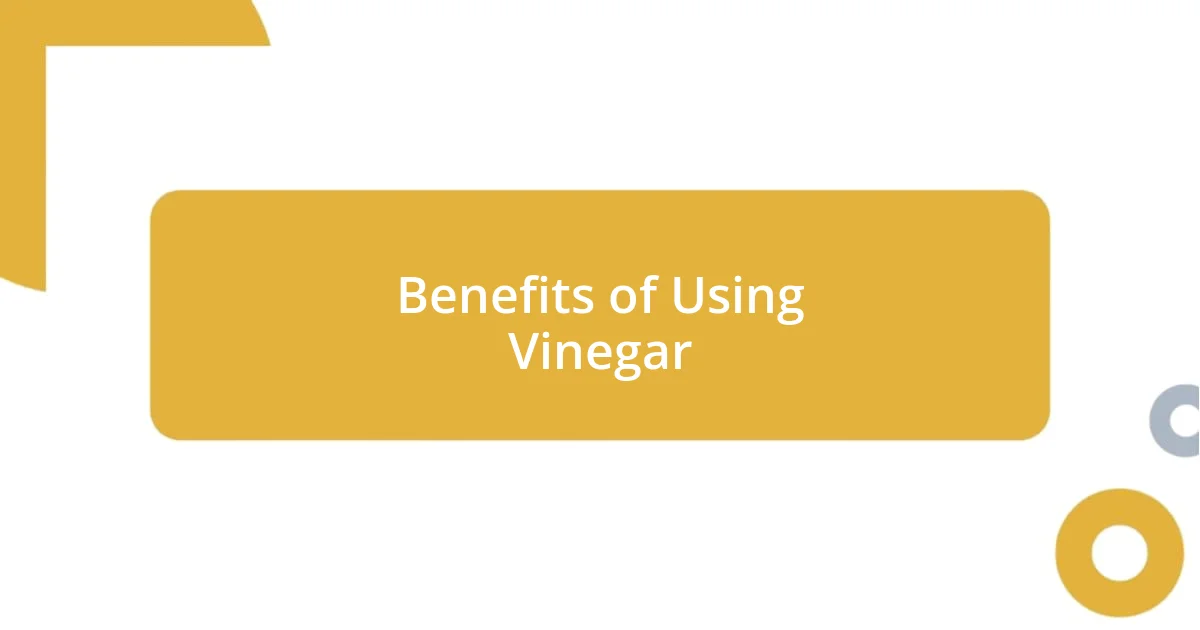
Benefits of Using Vinegar
Vinegar offers a plethora of benefits that might surprise you. For instance, it’s a natural disinfectant due to its acetic acid content, which can kill bacteria and mold. I vividly recall the time I tackled the stubborn mildew in my shower. A simple spray of diluted vinegar worked wonders, and I felt a rush of relief and satisfaction watching the mold vanish. It’s amazing how something so ordinary can turn into a cleaning superhero!
Here are some more benefits of using vinegar as a cleaner:
– Eco-friendly: It’s a non-toxic option that’s safe for the environment.
– Cost-effective: It’s inexpensive and often more affordable than commercial cleaners.
– Deodorizing: It effectively neutralizes pungent odors left behind by cooking or pets.
– Natural stain remover: I once spilled red wine on my favorite shirt; soaking it in vinegar solved the problem effortlessly.
– Versatile: It works on various surfaces, from kitchen counters to bathroom tiles.
With these benefits in mind, I’ve become a fervent believer in vinegar’s cleaning magic!

Types of Vinegar for Cleaning
When it comes to cleaning with vinegar, not all types are created equal. I’ve found that white vinegar is often the go-to for its strong acidity, making it a powerful disinfectant and grease cutter. My encounters with stains on windows have led me to trust white vinegar for that streak-free shine. It’s incredible how a simple spray can transform surfaces!
Then there’s apple cider vinegar. It might surprise you, but this vinegar isn’t just for salads! I’ve discovered its effectiveness in deodorizing and tackling hard water stains, especially around faucets. The slight fruity scent adds an unexpected freshness to my cleaning routine, and let me tell you, it does wonders in the bathroom!
Lastly, malt vinegar, while less commonly used, has its place. I once tried it for cleaning my kitchen appliances, and I was pleasantly surprised at how well it worked, despite its stronger smell. It seems that each type of vinegar has distinct properties, catering to different cleaning needs. The exploration is half the fun!
| Type of Vinegar | Best Used For |
|---|---|
| White Vinegar | Disinfecting, cutting grease, and glass cleaning. |
| Apple Cider Vinegar | Deodorizing and removing hard water stains. |
| Malt Vinegar | Cleaning kitchen appliances. |

How to Make Vinegar Cleaner
To make your own vinegar cleaner, all you need is some white vinegar and water. A simple mixture is to combine equal parts vinegar and water in a spray bottle. I remember when I first did this; it felt like I had discovered a hidden gem. The scent of vinegar was surprisingly refreshing, and I was excited to test it on various surfaces around my home.
If you want to enhance the cleaning power and add a pleasant smell, consider adding a few drops of essential oils, like lemon or tea tree oil. When I experimented with this, I found that the added scent transformed my cleaning routine into a delightful experience. Plus, using essential oils can also add extra antibacterial properties, making your cleaner more effective!
For tougher stains or grime, I recommend using undiluted vinegar. There was a particularly stubborn grease spot on my stove that just wouldn’t budge. Spraying straight vinegar on it made all the difference, and within minutes, I saw the grime break down effortlessly. It’s rewarding to see your hard work pay off with just a simple product!

Effective Vinegar Cleaning Recipes
I’ve come to love a vinegar and baking soda paste for those tough-to-clean messes. Just mix a little baking soda with vinegar until you achieve a paste-like consistency. I remember the excitement of using it to scrub my bathroom tiles; the fizzing reaction between the two made it feel like a mini science experiment! Watching the grime lift away was a small victory that left me feeling accomplished and ready to tackle the next chore.
Another effective recipe in my cleaning arsenal is a citrus-infused vinegar. Simply take a jar, fill it with lemon or orange peels, and then cover them with white vinegar. After letting it sit for a week, you’ll have a powerful cleaner that not only breaks down grease but also leaves a zesty scent that’s so invigorating! The first time I used it, I was impressed by how natural it felt – like I was harnessing the power of nature itself to combat the everyday messes in my home.
For an easy all-purpose cleaner, I often mix one cup of vinegar, one cup of water, and a tablespoon of dish soap in a spray bottle. This recipe has saved me countless hours of stressful scrubbing. I recall the hectic mornings when I needed to quickly tidy up before guests arrived; having this solution ready to spray made all the difference. It’s amazing how something so simple can easily become a reliable part of my cleaning routine!
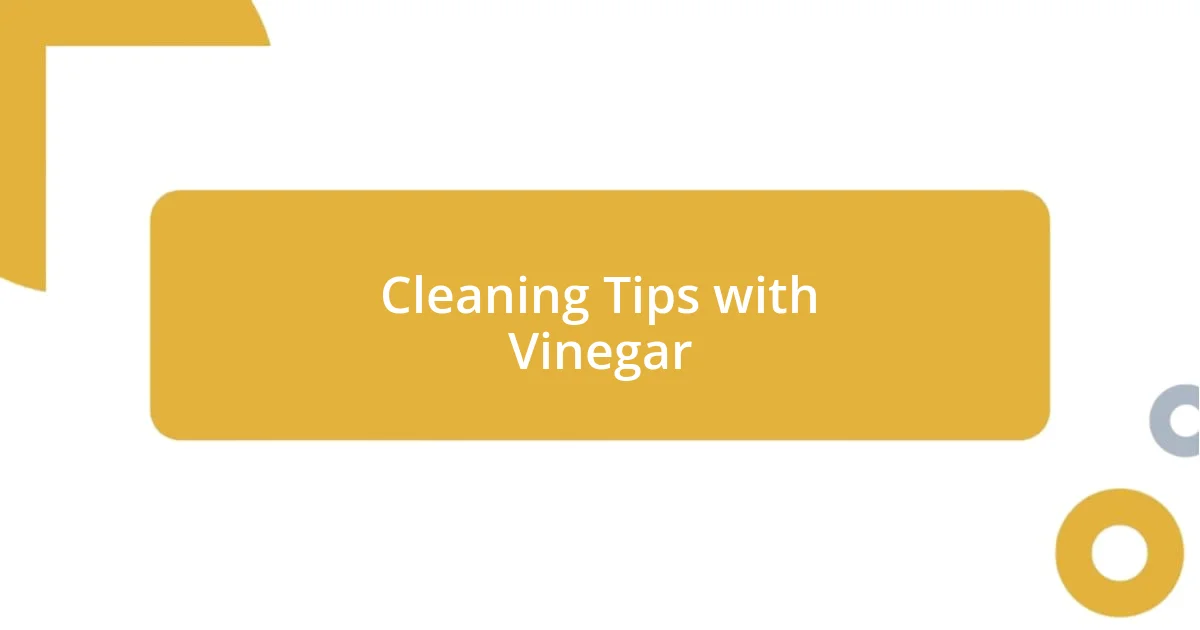
Cleaning Tips with Vinegar
Making the most of vinegar as a cleaner can be a game-changer in your cleaning routine. One of my favorite tips is using vinegar to clean glass surfaces. I simply spray a mixture of vinegar and water onto windows or mirrors and wipe it down with a microfiber cloth. The sparkle it leaves behind gives me a small sense of pride, knowing I’ve achieved streak-free shine with a natural product.
I once faced a particularly stubborn mineral buildup in my shower head. It seemed impossible until I remembered vinegar’s magic. I soaked a plastic bag filled with vinegar over the shower head overnight, and the next day, I was amazed! The buildup had vanished, showcasing how effective and effortless cleaning can be. Have you ever tried something like that? It’s such a simple solution that brings instant gratification.
Another tip that has saved my sanity is using vinegar for laundry. I add a cup of vinegar to my wash cycle as a fabric softener substitute, and I can’t stress how soft my clothes feel afterward. Plus, it helps eliminate odors, which is a huge win for someone like me who enjoys cooking! It feels reassuring knowing that something so ordinary can enhance my laundry routine, making my home feel fresher without needing harsh chemicals.

Safety Precautions When Using Vinegar
When using vinegar as a cleaner, it’s essential to consider its interactions with other substances. Mixing vinegar with bleach can produce toxic chlorine gas, which is incredibly harmful. I learned this the hard way during a cleaning frenzy when I absentmindedly mixed the two. The fear that rushed through me as the fumes filled the air was a serious wake-up call, reminding me that safety always comes first.
It’s also worth mentioning that vinegar’s acidity can damage certain surfaces. I once ruined a beautiful wooden table by using vinegar to clean it, believing it would help restore some shine. The lesson? Always test a small, hidden area before diving in. This precaution not only protects your belongings but also spares you from potential regrets later.
Lastly, while vinegar is generally safe, it’s a good idea to use it in well-ventilated spaces. The strong smell can be overwhelming, especially in smaller areas. I remember cleaning my kitchen with vinegar and feeling lightheaded after a while. Opening a window or turning on a fan makes a surprisingly big difference, ensuring you can enjoy the cleaning experience rather than dread it.





